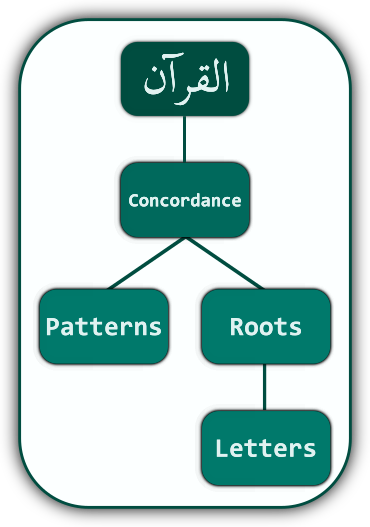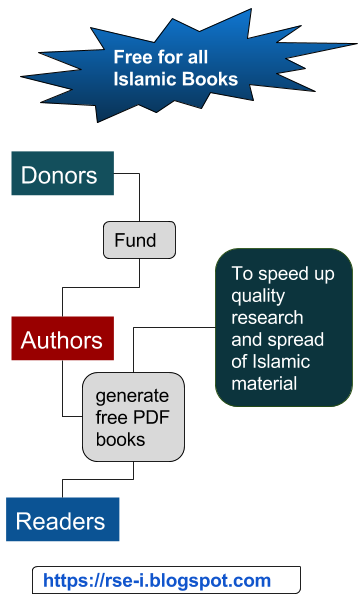
1. Qur'an Concordance based on Roots
The steps involved in this type of Qur'an Concordance are:- Identify and write the roots for Qur'anic Words.
- Arrange same root words together.
- Split the different words from the same root.
- Identify the singulars for broken plurals and write the roots. (Singular for sound plurals and dual are almost always understood)
- Identify and list Aayaat for each root, sorted further under different words from the same root with the particular word highlighted in different color in each Ayah. The Aayaat containing the plurals of a word are then to be listed after listing all the Aayaat with their singular.
- Though Roots cannot be assigned for most of the particles, particles concordance should also be part of this type of concordance. For particles, arrangement and listing of Aayaat can be done based on the different usage categories of the particles.
- Similarly proper names should also be included in this type of concordance. In short, every Qur'anic Word or Particle should be part of this concordance.
2. Qur'an Concordance based on Patterns
The steps involved in this type of Qur'an Concordance are:- Identify and write the patterns for Qur'anic Words.
- Identify the singulars for broken plurals and write the patterns for both the singular and the broken plural. The Aayaat containing the plurals of a word are then to be listed after listing all the Aayaat with the singular.
- Identify and list Aayaat for each pattern, sorted further under roots i.e. list all instances of the pattern for 1 root and then the next and so on, with the particular word highlighted in different color in each Ayah.
- Particles and proper names should be part of this type of concordance also for completion.
3. Qur'an Concordance based on Letters
This is an extension of Root based concordance.The steps involved in this type of concordance are
Start from Root Based Concordance and arrange roots along with their derived words, based on the following sorting orders :
- Common letters: Lists roots with common root letters in 1st 3 locations i.e. different roots formed using the same 3 letters, but in different order.
- F3L: Lists roots sorted according to root letter of ف then ع then ل
- L3F: Lists roots sorted according to root letter of ل then ع then ف
- 3LF: Lists roots sorted according to root letter of ع then ل then ف
- FL3: Lists roots sorted according to root letter of ف then ل then ع
- 3FL: Lists roots sorted according to root letter of ع then ف then ل
- LF3: Lists roots sorted according to root letter of ل then ف then ع
Examples of Root Based Concordance
3 Concordance books are available in Arabic Almanac and 1st book of 3 book set from this book is also planned to be added inshaALLAH! . Concordance of Particles is available in Arabic Particles tool in the book for which the code is mentioned there as hr. In addition to these, Arabic Roots Tool allows a user to see Qur'an Concordance based on roots in Qur'anic Arabic Corpus, Furqan, Qur'an Wikipedia and al Qur'an eu. In addition to these, free roots based concordance PDF is also part of Qur'an Concordance : Roots - Patterns - Letters .More Types of Qur'an Concordance:
- Qur'an Semantic Word Domain Concordance, previously called Qur'an Synonyms Concordance. Project was successfully completed in July 2018. See: Qur'an Concordance : Roots - Patterns - Letters for PDFs and introduction.
- Qur'an Word Set Concordance, A new idea recently introduced by me based on repeated Aayaat and repeated Word Sets data. Qur'an Word Set Concordance PDF was launched on Qur'an Concordance : Roots - Patterns - Letters in July 2018.
Last edited : 6th August 2018

